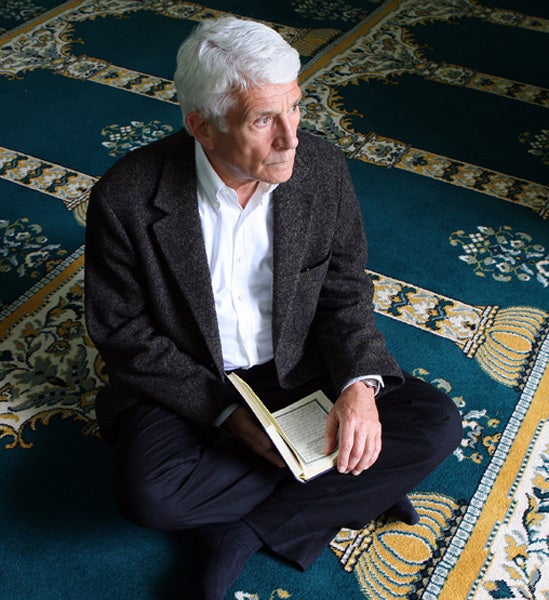Last Night's TV: The Qur'an, Channel 4; Banged Up, Five
Man on a mission restores some faith

Whatever is the opposite of turning in one's grave, Lord Reith must be doing it. The old boy, who gave the BBC the mission to educate, inform and entertain, would have heartily approved of The Qur'an, even if as a beetle-browed son of the kirk he would have wondered why two hours were being cleared from the schedules to transmit it. This wasn't the BBC's decision, of course, but that of Channel 4, which is more the home of Reithian values these days (not that there's much educational, informative or indeed entertainment value to be found in the Big Brother house any more).
The Qur'an was an exemplary piece of programme-making and Antony Thomas, who produced, directed and wrote it, fully deserves to go to paradise with 120 virgins. But not before he gets to focus his expertise on other complicated subjects. This was proper television for grown-ups.
At two hours it was also bottom-numbingly long, and I did wonder beforehand whether it might be excusable to take a 20-minute snooze somewhere in the middle, but I stayed awake and alert throughout, and congratulated whoever it was who decided to run the thing in a single go, and not in two or even three parts. In the age of the short attention span, that showed resolve, although I wonder how easy it was to sell advertising space: "Hello, would you like to take a 30-second spot in the middle of a two-hour documentary we're showing? It's called The Qur'an? Hello ... hello?"
Of course, even over two hours it is easier to squeeze a camel through the eye of a needle than it is to explain the complexities of the Qur'an. Thomas did a fine job, concentrating on the apparent contradictions in "the most ideologically influential text in the world". How can a text that preaches tolerance and forgiveness, a text in which Jesus and Moses are revered as prophets no less than Muhammad, also be cited in justification for the jihad, the fatwa, the slaughter of the infidel? How can some Muslim countries have women as heads of state, and others insist on women being treated as chattels?
An admirable man called Dr Muhammad Hurani, from the Society for Inter-Religious Understanding, came closest to untangling these riddles, explaining that the Qur'an is like a supermarket, from which different shoppers choose different items to suit them. So it is with all religious texts (which, for the record, is why I maintain a robust scepticism about the existence of the Almighty: good people do good things in the name of religion, and bad people do bad things) but perhaps above all in the case of the Qur'an, which is frequently invoked in attempts both to make peace and to declare war. These contradictions have exercised scholars in every one of the 14 centuries since the word of God was supposedly revealed to the Prophet Muhammad, by the Archangel Gabriel, in a cave. Apparently, it boils down to whether Islam is feeling threatened by the non-Islamic world. There is one interpretation of the Qur'an for peacetime, and another in times of war. Which doesn't bode too well for the rest of this century.
Still, Thomas made sure that the benevolent face of Islam, all too often overlooked in the West, got a fair showing. I was almost moved to tears by the manifest decency and tolerance of a fellow called Sheikh Abdul Aziz Bukhari, who questioned how people can claim that their god is somehow more valid than their neighbour's. "Who are we to say that one is better? You have your religion and I have mine." That seems like a creed worth believing in.
Unfortunately, however, it is smothered by a belligerent, patriarchal form of Islam, called Wahabism, which has the formidable support of Saudi Arabian petro-dollars. This programme suggested that over the past few decades, upwards of $100 billion has been spent promoting Wahabism, and that the 10 million or so Qur'ans that roll off the printing presses each year are carefully doctored to appeal to modern emotions and prejudices. Thomas also found footage of a Cairo street in the 1970s. It looked like any southern Mediterranean city, with not a veil in sight, yet the same street now is full of heavily veiled women. Oil, it seems, is to blame.
The youths in Banged Up can count themselves lucky that they are not getting Wahabi justice for their petty crimes. They have been locked up in Scarborough prison, re-opened just for them, to show them that life behind bars is worth avoiding. Last night they were joined by real ex-convicts, the hardest-looking bunch imaginable, who gave the same message some flesh and blood. I'm not sure about the participation of the former Home Secretary David Blunkett, whose presence is meant to add an air of authenticity, but somehow does exactly the reverse, giving a worthwhile experiment the stale whiff of "reality-show" contrivance. But it makes absorbing viewing, all the same. There's more of it around than you'd think.
Join our commenting forum
Join thought-provoking conversations, follow other Independent readers and see their replies
Comments
Bookmark popover
Removed from bookmarks